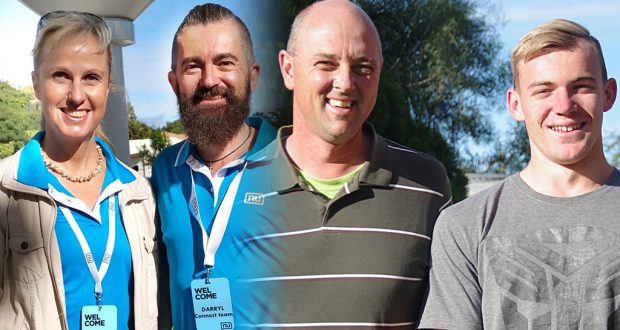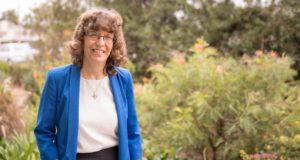Someone new walks into church. You’re torn between maintaining a polite distance and asking them around for lunch and afternoon Bible study. Dianne Jensen talks to two quite different Uniting Churches about welcoming newcomers.
Stepping through the church door can be a scary business. The jargon and rituals are unnerving—and that’s before someone is invited to stand up and sing! Yet the challenge of welcoming newcomers lies at the heart of mission. It lays bare the message we preach and is a core measure of healthy church communities.
Who’s the new guy?
We’re not talking about switchers or transferees from other churches. The National Church Life Survey (NCLS) defines newcomers as either first-timers or returnees from way back.
According to director Dr Ruth Powell in her 2015 paper Giving newcomers a voice: what newcomers reveal about their experience of joining a church, these people are likely to seek out the church in mid-adulthood (30–49 years). For over 80 per cent, the most important factor in deciding whether to come back is the friendliness of the people and the sense of community.
Peter Kaldor in Connections for Life: core qualities to foster in your church (NCLS 2002) says that many factors work together to create welcome. He cites a clear vision for the future, an intentional outward focus, attenders who are keen to invite others and worship that attenders find positive and helpful as top attributes.
His research shows that cutting through the traditional packaging of Sunday worship is essential to making faith both relevant and comprehensible to newcomers.
“Our church research confirms that … churches with contemporary styles of worship and music are more likely to be attracting and integrating higher levels of newcomers,” says Peter.
Too hard basket?
If all this sounds too hard, keep in mind that Uniting Churches of all shapes and sizes are already effectively incorporating newcomers into their communities (see our story on Magnetic Island Uniting Church). Journey spoke to two quite different churches to find out how they are living out their mission.
Standing out in a crowd
Marcelle Fricker is newcomers coordinator at Newlife Uniting Church on the Gold Coast, a fast-growing church with between 300 and 400 people at each service. The Connect ministry was set up to ensure that newcomers don’t get lost in the crowd.
“Number one, newcomers are looking for someone to talk to them,” says Marcelle. “Some people come with specific needs; some haven’t been to a church in decades, and others are coming from a different denomination—but everyone wants to know that they are not going to feel like an outsider.”
The Newlife Connect volunteers wear distinctive shirts and staff the car park, church courtyard and welcome desk. During the service people are invited to fill out a contact card which can be exchanged for a coffee voucher and welcome. There is also a dedicated welcome space outside the church, hosted by the young families’ pastor.
“It’s the degree of welcome that makes that work or not, so we are very intentional about how we greet people,” says Marcelle. “We also have section leaders in the church on the look-out for new people or people sitting alone so that no one feels unloved.”
Once details are in the pastoral care system, a welcome text is automatically generated within 24 hours and Marcelle follows up with a phone call. Welcome functions are held every six weeks and new Christians or seekers are channelled into an appropriate group such as Alpha or Christianity Explained.
Small groups are key to integration, she says. “It’s how we do most of our pastoral care—especially in a growing church, having quality small groups makes a big difference.”
Leap of faith
Darryl Holbrook, 50, had become a Christian about two years before a friend invited him to Newlife. Although he stayed in the back rows initially, attracted by the church’s contemporary music and worship, Darryl realised that the next move was up to him.
“I said—we need to sit down the front, we are not talking to anybody and the whole idea of attending a church is to be part of that community. Well, my friend didn’t come back but I stayed and afterwards I would just go out into the courtyard and different people would come and say hello. I was going for about a month and then I got baptised—17 April last year—and about two weeks after that I joined a small group.”
Darryl understands that church jargon can be a barrier for the friends he invites to join him.
“Even when you talk about sin, non-believers don’t know what sin is so there’s no good telling them they are sinning because they are like, well what are you talking about? I just know that God did awesome things in my life. The people who have known me have watched that transformation and that’s why I get all these people talking to me about it—what’s going on, what’s happening? And I just invite them to church.”
Country welcome
The Uniting Church in the western Queensland town of St George has a vibrant congregation committed to sharing the gospel and willing to do things differently. Rev Derek Schiller says that delivering the message is foremost.
“Anything that is happening at St George is profoundly gospel-based. We focus on preaching the good news of Jesus Christ, the forgiveness of sins, and we find that plain language is central to breaking down some of the barriers. That might seem strange, but if you can drop the religion but keep the fundamental gospel message and talk in a relevant way—people are drawn to the church.”
St George has a transient population and there are often new families at church including short-term workers. Derek says that the combination of an outwardly focused congregation and country hospitality means that no one is left out. There are regular after-church activities such as lunches, water-skiing or Frisbee.
“When people come to our church we feel that they are warmly welcomed. People talk to them, invite them back
for lunch, and invite them to join groups that relate to them.”
The church has hired the old theatre and hosts a range of groups, sporting events and community activities including a Thursday night youth group with 40 high-schoolers and the Jesus A Friend For All primary school group with even more young people. The church’s winter day camp attracts over 150 children.
“Our view is that we have to break down the idea of church being just a Sunday morning event,” says Derek. “The church gathering is when two or three are gathered in my name, so we consider a lot of events during the week just as central to the church as Sunday morning.”
I was a stranger
Ned Jones, 17, still remembers walking through the door to attend afternoon Bible study at Derek Schiller’s place.
“Besides the fact that you know that everyone already there is a Christian, going there just sort of feels a little intimidating. You don’t really know if you should speak up and say what you think or just keep quiet. But I went there and it was really welcoming and Derek really encouraged me to speak up,” he says.
Ned was invited to the group by a Christian mate.
“He said, ‘You don’t need to love God, but I just want you to believe that he’s real’, so I went there and listened and it was probably one of the best decisions that I’ve made … it was amazing to be able to go to the sort of program that Derek runs—it was awesome, the stuff that he spoke about was just spot on.”
Ned feels right at home in the church community.
“Being able to go there and experience and worship the God who made us is amazing—and being able to learn how much he loves us is a ridiculous thing that I want everyone to be able to know.”
 JourneyOnline
JourneyOnline







